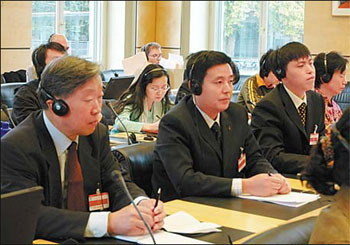Human rights and civil society's role in China
Updated: 2007-11-23 07:36
As Wan-Hea Lee, facilitator of the training workshop and an official with the Office of the UNHCHR, emphasized, reporting "is not the end but a means" to carry out the principles of the treaties to the letter. The message is strong and clear that the process to prepare the report overrides the report per se.
"What we should highlight in our reports to the UN are the obstacles we face, the problems we confront, and the measures we have taken and are going to take to improve them," says CSHRS council member and Nankai University professor Chang Jian, who attended the workshop.
|
|
The workshop helped participants learn where the UN human rights treaty bodies needed improvement. "I hope the treaty bodies streamline their mechanisms to be more just and more efficient," Liu says. "The focus should be on the implementation of the seven major treaties, centering around the two covenants: the International Covenant of Economic, Social and Cultural Rights and the International Covenant on Civil and Political Rights, which China is yet to ratify."
Liu says there's no need for too many treaties and bureaucratic bodies. UN human rights guarantees are more of a promotion, and less of arbitration or about challenging violations in a court.
But after attending the workshop, he and his fellow participants have begun to think more about their own work and contribution.
Peking University Women's Law Studies and Legal Aid Center Director Guo Jianmei says: "We as an NGO have offered consultation to prepare several state party reports on the implementation of the Convention on the Elimination of All Forms of Discrimination against Women. In future reports, we'll continue our efforts to reflect vulnerable groups' interests and have their voices heard."
"We are considering preparing independent reports in future, too." Actually, civil society is encouraged to prepare alternative reports to state parties.
Guo's center has been providing legal assistance to women in need to safeguard their legitimate rights. China, she says, has made remarkable progress in this field in the past decade, yet its communication with the international community has been weak. "We NGOs have an advantage in this regard and we feel the need to hold talks between NGOs and government departments."
Several participants were struck by some to-the-point comments made in the treaty bodies' review of the state party reports and by special rapporteurs during their inspection tours in China, which are open to the public.
"We all have our plans of action," says Guo. "We'll share whatever we've learned in Geneva with our peers and initiate more training programs among law enforcers, educators, government officials, social workers and other members of society to disseminate the principles of the international human rights treaties."
"Quite a few of their (treaty bodies') suggestions are objective and have led to improvement in legislation and law enforcement to protect human rights," says Yuan Hong, of All-China Women's Federation. She saw its reflection in China's revised Law on the Protection of Women's Rights and Interests in 2005.
"More than 20 government departments are part of the coordinating mechanism led by our federation," she says. Which means "officials are getting more conscious of women's rights and interests."
Qi Yanping, council member of Chinese CSHRS, was particularly interested in several treaty bodies' suggestion that China consider setting up a national commission for human rights. "More than 100 countries have set up such an institution based on the Paris Principles, which is independent of the government and legislation to coordinate human rights issues within the country," says Qi, who is also a professor in Chinese University of Political Science and Law.
Qi has been working on a research project on introducing the mechanism to China. "We have some functional institutions taking care of human rights. For instance, every government department, from the central level down to the township, has special staff handling letters from the people, which are in fact very similar to the teams dealing with complaints under the treaty bodies." The workshop made Qi realize the need to have such a mechanism in China all the more.
Some of the comments at the workshop, however, were not very factual, the participants say. Song Wenyan, of All-China Women's Federation, finds the report of the special rapporteur on education to be "wrong" in its assertion that China's laws still regard the girl child and physically challenged children as worthless.
|
|
|
||
|
||
|
|
|
|


